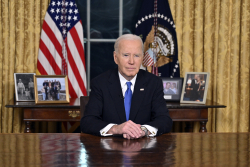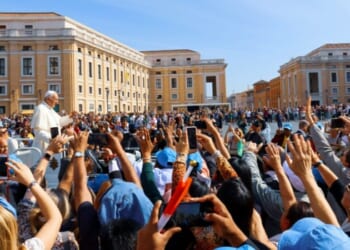South Korea can become a powerful force in Asia by enhancing maritime deterrence, defense exports, and economic security cooperation without confronting China or over-relying on the U.S.
South Korea can take an even more proactive, multidimensional role in its neighborhood without directly confronting China.
Five potential contributions stand out:
First, South Korea could provide indirect maritime support. It could signal the possibility of contributing to a second front, rather than joining the U.S. in the hotspot. For example, Korea could help patrol key maritime trade routes in the South China Sea during a Taiwan contingency, securing commerce while avoiding direct military conflict. This complicates China’s strategic planning and contributes to deterrence. In return, Seoul could request U.S. cooperation in acquiring nuclear-powered submarine capabilities for long-range undersea patrols, making such regional burden-sharing explicit.
Second, South Korea could consider low-intensity, indirect signaling operations when the United States is preoccupied with confronting China elsewhere. Seoul could consider proportionate responses in disputed zones, such as crossing the 124°E meridian or building artificial structures near contested maritime zones.
China routinely asserts jurisdiction over 70 percent of the Yellow Sea, with little convincing justification. It has recently also constructed massive steel structures in the Korea-China Provisional Measures Zone (PMZ). Reciprocal measures could raise the cost of Chinese gray-zone operations without provoking direct conflict.
Third, South Korea can help the U.S. focus on critical theaters by bolstering its independent capabilities. Seoul should request reopening talks with the U.S. on uranium enrichment and reprocessing (ENR) to revise outdated nuclear agreements. Acquiring nuclear latency, the ability to swiftly produce atomic weapons without fully arming—could deter North Korea, allowing the U.S. to prioritize Taiwan or the South China Sea during crises.
The ENR capability itself provides deterrence via two mechanisms. First, it enables delayed nuclear retaliation within weeks or months, deterring the adversary. Second, adversaries may hesitate to escalate tension, fearing it would push South Korea to complete its nuclear weapons program.
Fourth, South Korea could exploit its comparative advantage to aid the U.S. posture in the region. Korea’s shipbuilding sector, long noted by the U.S., could be vital in closing the ship gap with China. The U.S. Navy lags in warship production, and the Jones Act bars overseas construction.
However, maintenance, repair, and overhaul (MRO) are permitted. China’s shipbuilding capacity is over 230 times larger than America’s, which spells a problem for the naval balance of power, where quantity is as important, or even more critical than, quality. Korean shipyards could become the industrial base of allied maritime power in East Asia, making up for this disadvantage.
Fifth, just as South Korea could revitalize European defense through arms export, it can also support rearmament in Southeast Asia. Korean arms exports to Southeast Asia could support regional deterrence without fueling a destabilizing arms race. Countries like Vietnam, Indonesia, and the Philippines increasingly distrust Beijing despite close trade ties.
Korean arms exports would raise the cost of unilateral Chinese action and help preserve regional stability. Given that Seoul already supplies many of these markets, Beijing would have difficulty retaliating against further expansion without appearing contradictory.
When it comes to the issue of the USFK’s strategic flexibility concerning Taiwan, Seoul must also be realistic. Given North Korea’s constant threats, South Korean leaders are correct to try to keep the entirety of U.S. forces on the peninsula at all times. However, USFK operates under American command. If Washington redeployed some troops to a Taiwan crisis, Seoul might have little practical recourse.
Consider the inverse: would Korea accept Japan blocking U.S. troop movements to the peninsula during a North Korea emergency? Seoul could instead ensure that strategic flexibility bolsters the case for continued U.S. presence in Korea by ensuring regional utility beyond North Korea. Achieving ENR is critical in this sense, as an autonomous insurance against a partial USFK relocation.
Innovative cost-sharing measures could also strengthen USFK’s legitimacy. While South Korea should avoid fully acquiescing to U.S. demands for increased payments, resisting heightened financial contributions may be challenging, especially given the Trump administration’s pressure-driven approach toward allies.
One alternative Seoul should consider is substituting cash payments with the provision of arms and munitions directly to the United States or third parties designated by Washington. These would be produced by South Korean defense firms and funded by the South Korean government. This arrangement offers three key advantages.
First, it would help compensate for production shortfalls within the overstretched U.S. defense industrial base.
Second, it would serve as a de facto subsidy for South Korean defense manufacturers, fostering economies of scale.
Third, exporting high-quality South Korean weaponry could contribute to regional stability by enhancing deterrence in key geopolitical flashpoints.
Korea should consider adopting a “clear strategic ambiguity” posture on Taiwan. It can affirm opposition to unilateral Taiwanese independence but also commit to indirect support if and only if China initiates force absent such a declaration. As long as Taiwan’s democratic way of life is preserved, de jure recognition or UN membership is secondary. Like the U.S., Korea’s priority should be maintaining the status quo.
Indeed, South Korea must be cautious not to trigger an unnecessary security dilemma; efforts to enhance its security could prompt countermeasures from adversaries, paradoxically leaving the country less secure. Expanding frank and direct communication channels with China and North Korea remains essential. Seoul should also avoid excessively worsening security relations for the sake of symbolic gestures that offer little strategic benefit.
At the same time, it cannot afford to neglect defensive measures based on assumptions of the opponents’ benign intentions. After all, these opponents likely have not decided their course of action; they are observing and adjusting to the real-time balance of power. Moreover, it remains uncertain whether there are realistic and politically viable concessions that could meaningfully reduce mutual suspicion.
In this context, strengthening deterrence is the least-worst option available.
How South Korea Can Grow Stronger Through Its Economy
Beyond hard power, South Korea can lead efforts to build a new economic security architecture. A regional “economic NATO,” as envisioned by figures like Rishi Sunak (“Tech NATO”), Liz Truss (“Economic NATO”), Victor Cha (“Collective Resilience”), and Rahm Emanuel (“Anti-Coercion Coalition”), could provide four key functions:
First, it could coordinate a collective response to economic coercion. When China economically pressures a specific country, member states collectively impose counter-sanctions and support the affected country.
Second, it could facilitate advanced technological cooperation and investment in high-tech industries. This would promote sustainable growth through technology sharing and joint research and development initiatives.
Third, an economic NATO could help members synchronize policy and rhetoric. Partners could coordinate the content and timing of policies likely to provoke economic retaliation, thus preemptively preventing exemplary punitive actions.
Fourth, it could enable member trade policy coordination and trade dispute mitigation. Unlike current supply chain diversification, which is defensive, this would shift toward deterrence, raising the cost of coercion and complicating adversaries’ decision-making.
Skeptics might question whether a second Trump administration would support such an initiative. But the case can be made.
U.S. tariffs aim to reduce trade deficits, not coerce political outcomes, which is fundamentally different from Beijing’s tactics. Further, like NATO’s intra-alliance de-confliction mechanism (e.g., Greece–Turkey), an economic NATO could reduce intra-bloc disputes, and Trump’s protectionist tendencies could enhance the credibility of joint deterrence.
Finally, free-riding concerns would be minimal with flexible, case-by-case responses and no rigid spending targets. Contrary to common perception, most security alliances rarely lead to entrapment; states carefully craft alliance terms before and after formation to limit risks through contractual safeguards. Similarly, an Economic NATO could be structured to avoid issuing blank checks for provocative actions and to guard against unnecessary escalation.
Granted, the second Trump administration’s radical foreign policy shifts are increasing fear even amongst many U.S. allies in Asia about America’s abandonment. However, to equate such an unconventional approach with impending wholesale U.S. withdrawal from the region might be overblown.
After all, even for the U.S., a grand bargain with China is much less feasible than one with Russia. Beijing is simply not trustworthy enough to be allowed dominance in Asia. If Asia, the global economy, and a high-tech innovation engine, falls under China’s sway, America’s prosperity could depend on Chinese goodwill. Its international influence would also be in jeopardy.
The U.S. consolidated the Americas via the Monroe Doctrine and Roosevelt Corollary, before striving for global impact. As long as its Asian allies pull their weight and render Chinese hegemony uncertain, the U.S. will prefer not to retreat from the most critical region in the world.
South Korea Grows Stronger Despite/Because of U.S.-China Competition
The U.S. Republican Party has already undergone a foreign policy realignment. National Conservatives now favor strategic prioritization and economic nationalism over Neocon-style democracy promotion. This may be a generational shift, not a passing trend. The world is unclear whether this wind is for better or for worse.
However, it seems clear that the “business as usual” era has passed.
Korea must also adapt to shifting realities, including the changing discourse in Washington itself. A new global and regional order will likely emerge beyond the Liberal International Order. Many speculate that this latest order will be more exclusive and fragmented, further increasing the need to be a rule-setter rather than a rule-taker. Seoul should consider drafting a principles-based “Indo-Pacific Charter” with like-minded states, just as the Atlantic Charter 1941 shaped the postwar principles.
The traditional foreign policy triad, North Korea-centrism, deep U.S. reliance, and naive engagement with China, may require rebalancing in light of today’s geopolitical realities. Korea also lacks a coherent national security doctrine linking foreign policy, defense industry, technology, and society. Bureaucratic silos and inertia stifle innovation.
A new strategic narrative must rise, rooted in realism, committed to regional leadership, and backed by a clear grand strategy.
Meet the Author: Taehwa Hong
Taehwa Hong is a Non-Resident Fellow in the Eurasia Program at the Foreign Policy Research Institute and a PhD Politics student at Princeton University. Hong advises South Korean politicians and government officials. He was formerly a research assistant and intern at think tanks, including the Hoover Institution, Institute of National Security Studies (Israel), Freeman Spogli Institute, Korea Economic Institute, and the EastWest Institute. Taehwa Hong’s research focuses on U.S. Grand Strategy, International Security, the Indo-Pacific, and the Middle East. His analyses have appeared in publications such as Foreign Policy, Observer Research Foundation, The Business Times, Asia Times, YaleGlobal, and The Fletcher Forum of World Affairs. He also regularly writes columns for major Korean news media, including JoongAng Ilbo, Monthly Chosun, and Shindonga. Hong holds a B.A. in International Relations from Stanford University and an MPhil in Politics and International Studies from the University of Cambridge.
Image Credit: Shutterstock/ Chintung Lee.


















